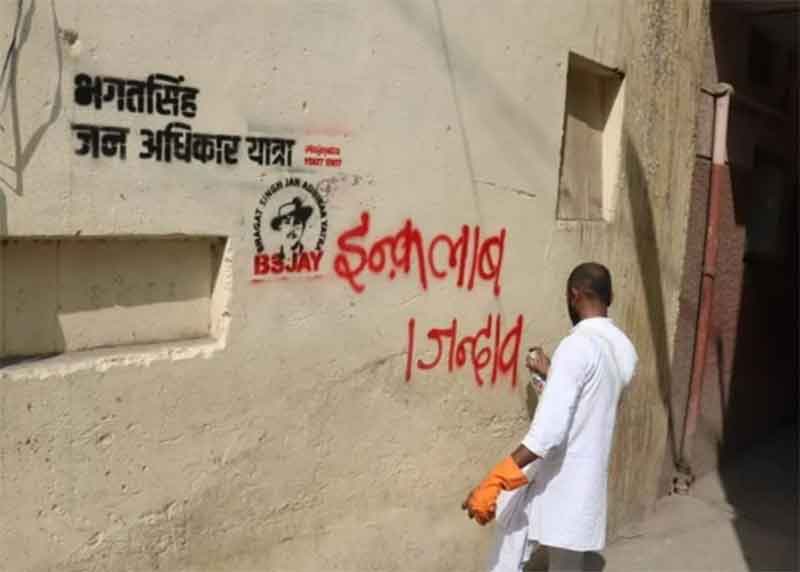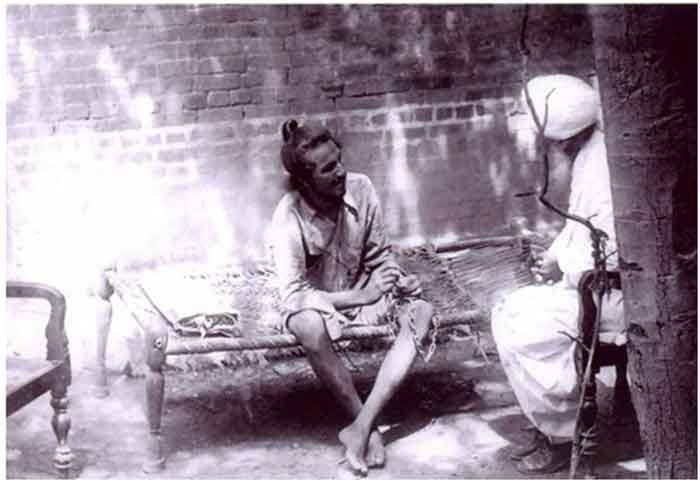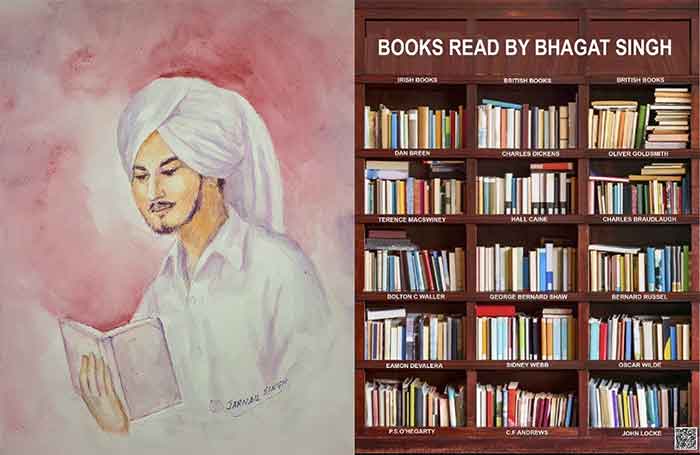
Bhagat Singh with a pseudo name of Balwanth Singh wrote an article titled ‘Viswa Premi’ in a Calcutta based Hindi weekly ‘Math Wala’. In that article he praised the Italian revolutionary Mazzini, Russian revolutionary Lenin, American revolutionary George Washington and the leaders of the French revolutionaries as those who are being loved by the people of the universe. The following sentences from the same article express his emotion.
“As long as the words like ‘black and white’, ‘ruler and ruled’, ‘rich and poor’, ‘touchable and untouchable’ etc. are being used there would be no universal kinship and universal love. ” says Bhagat Singh.
He asserts that until Universal Love is nurtured as a culture, we have to hate certain sections of human beings.
Is there any such leader in the subcontinent now, who can be respected as common leader of it?
According to Dr. Bhogaraju Pattabhi Sitharamayya, who wrote the history of the Congress Party, ‘as like Gandhiji, Bhagat Singh’s name is most popular in the subcontinent.’ Can we consider that the same situation is prevailing at present?
I suppose it is not improper to put forward such a question on the occasion of the 76th death anniversary of Shaheed Bhagat Singh which falls in his centenary year. I raised the same doubt about our common heritage in my visit to Lahore Fort, when visitors other than Pakistanis are charged Rs. 50/- as entrance fees and Pakistanis are charged only with Rs.10/-. I argued with the officer in charge of the fort that the Indians who are visiting this fort built by Shahajan are not foreigners to Shahajan and it is not built by Pakistan rulers. So it is unjust to collect more money from Indians. The fees must be the same both to Pakistanis and Indians.’ The officer in charge of the fort accepted my argument but the policy decisions are not in their hands.
Today we are remembering common history and discussing the 150 years old, First War of Independence. We are commemorating the centenary of the book on that struggle written by V. D. Savarkar, one of the great patriots of that time, 1907. We are also talking about Vandematharam song and Vandematharam movement. In the forthcoming next six months we are making preparations in our own way to celebrate the centenary of Shaheed Bhagat Singh. The heritage of history and culture before the partition (independence) belongs to the undivided India. Then Bhagat Singh will be our common martyr hero of the subcontinent. Other fields especially other than political one do not have as much flexibility as the art and literature domains, in sharing and thriving this common spirit. The main responsibility for the good and bad that happened and is happening is likely to be borne only by the political sector and so its impact is prominent. And the ultimate solution is also in its hands.
Bhagat Singh was born in a village called Banga in Lyallpur district (now Faisalabad) of the present Pakistan. Lahore, the political capital of the Punjabis and the centre of activity of Bhagat Singh’s Nau Jawan Bharat Sabha is also in Pakistan today. Hussainiwala is the village where the bodies of the martyrs Bhagat Singh, Rajaguru and Sukhdev were smuggled out by breaking the wall behind the Lahore Central Jail and the dead bodies were chopped in to pieces with axes to make them burn quickly by applying kerosene. It is 15 km away from Ferozpur west of river Sutlez. At the time of partition Hussainwala village where the last rites of the martyrs were held became a part of Pakistan. Later the government of India acquired this historical place in exchange of land elsewhere. Until the Kargil war, every evening joint parades of both the armies used to take place in Hussainwala village also as carried out in Attari-Wagah border. Every year on 23rd March people assemble here from both the countries to pay their tributes to the martyrs by organizing a great fair.
I enquired a 10th class Pakistani Pashtho (Pathan) boy whether he knew the name of Bhagath Singh. The boy looked at me as to who he was. I further asked him whether the name of Bhagat Singh was included in the history of freedom movement. A middle aged man near the boy replied that the name of Bhagat Singh appears only in the degree history books. In Lahore museum we do not find the photo of Bhagat Singh but we can find the picture of a South Indian congress leader Rajagopalachari. Lahore was the main centre of activity of Bhagat Singh and his fellow revolutionaries. He along with his two friends were hanged in that city. A week long hartal took place expressing dissent over their hanging. It grieved me a lot as there is no portrait of Bhagat Singh in a museum run by the government. But a great relief came on the same day, as I came across a drama troupe of lady students performing ‘Inquilab’ a play on Bhagat Singh’s life and martyrdom.Though the rulers are trying to ignore Bhagat Singh, even after so many years the people of the subcontinent did not forget the vigor and vitality of his ideology and his great selfless qualities.
According to Bhagat Singh, it is mandatory to detest the supporters of inequalities, until social equality is achieved. Many gentlemen may disapprove Bhagat Singh’s goal of socialist revolution but at the same time the same gentlemen bow their heads before his sublime self sacrifice. There may be some others who do not accept his slogan ‘Inquilab zindabad’ and his aspiration for the downfall of imperialism throughout the world. However the rulers of both Pakistan and India are doing injustice to Bhagat Singh. They are introducing Bhagat Singh as a terrorist in the textbooks. His famous articles ‘Why I am an Atheist?’ and his ‘Last Testament’, are not included in the syllabus of any course. Reformists of all kinds are not treating this as a historical injustice to Bhagat Singh. Some communist cadre and mediocre intelligentsia who do not know the difference between terrorism and revolution also do not feel this as historical mistreatment.
Bhagat Singh repeatedly condemned terrorists and terrorist activities. He made it clear that terrorism is not a revolutionary path, right from his Delhi Sessions Court declaration on 6th June, 1929, to his message to the nation which is considered to be his last will and testament on 2nd Feb, 1931 sent 50 days before his execution. Various reformists, writers of history textbooks and those who support status quo believed reformism is the only best way in contrast to terrorism. They try to deceive people by saying that there are only two ways of social transformation i.e. reformism and terrorism. But Bhagat Singh in his Testament clearly quoted that Gandhism and terrorism will yield ultimately the same result. It means simply transferring power to the black people by the white rulers. All of us know very well that Bhagat Singh was against reformism. Terrorism and reformism are two sides of the same coin in the view of Bhagat Singh. He condemned terrorism on several occasions and called it anti revolutionary activity.
The trend of treating Bhagat Singh as a terrorist is still continuing among several kinds of reformists and poets who eulogize sacrifices. They consider that such an attitude is revolutionary. The anti revolutionaries play a considerable role in such propaganda along with amateurs. Such a distorted view of Bhagat Singh is intentionally projected by ruling parties which has yielded completely to imperialist globalization.
Let us see in this period of 60 years whether justice was done to the sacrifices made by innumerable martyrs who offered their lives readily to liberate the people of India from exploitation and oppression of the imperialists and from poverty, illiteracy and social discrimination. What type of benefit did the 140 crores of population derive from the partition of the country? As imperialism, sectarianism, communalism, superstitions and backwardness continued today in a new garb, as they were existed at the time of Bhagat Singh, we have to propagate a clear picture of him avoiding distortions. This is not necessary only to Andhra Pradesh or to India, it is necessary to the whole subcontinent as he is the only common hero of the subcontinent.
The British imperialists transferred power only on the condition of partitioning the country into two, basing on Hindu and Muslim religions. Once a single country was divided now as three countries. This division resulted in the communal riots where 20 lakhs of people were massacred and one crore and fifty lakhs of people migrated from one country to the other, leaving their native villages and sentiments. By this division Punjab was broken into two pieces. Sikhs and Punjabi Hindus were forced to stay in India and Muslim Punjabis in Pakistan. Bengalis also were divided on religious basis as East Bengal and West Bengal.
The princely states of Hyderabad and Kashmir were also awarded freedom. We know well about the developments of great Telangana peasant’s armed struggle. The issue related to Kashmir is not yet solved. The people of Kashmir are sandwiched between the two countries just like a calf in between two fighting bulls.
In this period of 60 years three wars took place between India and Pakistan. In 1971 East Pakistan was separated and a new country Bangladesh emerged. In spite of all these partitions the long cherished common history and culture are continuing among the people of the subcontinent. If we search for the only common leader of all these three countries, we certainly remember the name of Bhagath Singh as an uncontroversial leader and common Hero of our subcontinent.
This is English translation of Divi Kumar’s Telugu writing in 2007 March, and the translation into English is by V. Vijayakumar, and translated in March 2023.
Divi Kumar, writer, 74 years, has been writing since 1969. Divi Kumar, poet, literary and social critic, playwright and artist, has been with Telugu revolutionary literary and cultural movement since 1970. He is at present President, Jana Saahithi, and has been working with the editorial board of Praja Saahithi since 1981. He retired as Telephone Technician from BSNL, and resides at Vijayawada, Andhra Pradesh State.
V. Vijayakumar (62) is progressive writer and translator. He is a retired English teacher, and resides in (old) Nallagonda district, Telangana state.














































